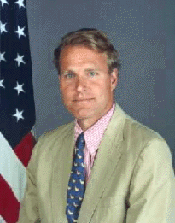Finally, he made his entrance. Assistant Secretary Walter H. Kansteiner III emerged from a hidden doorway and stood behind the podium. Tall, blond, and beautiful, he wore a blue seersucker suit, black loafers, and no socks. He was radiant.

The plantation charm, the Aryan beauty, the tailored threads -- I can imagine no better embodiment of the preppy virility and colonial mastery that is George W. Bush's America. And it isn't just image. Kansteiner's biography on the State Department web site (http://www.state.gov/r/pa/ei/biog/4059.htm ) allows for no illusions. With masters degrees in international economics and theology from American University and the Virginia Theological Seminary respectively, he is the natural heir to Great Britain's colonial fusion of religion and profit. He had been executive vice president of a "commodity trading and processing company" specializing in "tropical" commodities such as coffee, cocoa, and sugar. From there he moved on to become a founding principal of that great fusion of insider power and wealth, the Scowcroft Group. He has advised corporations in mergers, acquisitions, and privatizations in Africa, and is clearly expert in doing business there. The State Department biography adds that he has coupled his commercial experience with high-level policy work, serving as Director of African Affairs on the National Security staff, presumably during the previous Bush administration, and he has also worked as an Africa specialist for the Department of Defense in the capacity of "member of the strategic minerals task force." In other words, he is a man who regards Africa in terms of exploitation, wealth, and power.
Assistant Secretary Kansteiner concisely outlined his recent tour of several African countries, where, according to his account, he made quick stops to meet with national leaders and addressed regional issues. As he spoke he evinced extraordinary confidence. He convinced me completely of his mastery and command. The State Department official who had arranged my attendance of the event practically blushed when she spoke of him. I no longer wondered why. Here was a man worthy of Rome. All that lacked was the laurel wreath and the victory standards, the parade marking his return from the field and the celebratory frescos. Kansteiner Africanus.
The audience's part in the ritual came next. The twenty or so foreign journalists, mostly Africans, representing news services above and below the Sahara, raised their hands in hopes of getting to ask the Assistant Secretary a question. Despite the evident familiarity both among the journalists and between the journalists and Kansteiner, State Department protocol requires that after being called on to ask a question, one waits to be handed a microphone by an official. Then one must announce one's name and identify the paper or news service for which one works.
 It was a role call of the dominated and the supine. One by one the African journalists, men and women from Sudan, Egypt, Liberia, Cameroon, South Africa, and so forth raised their hands to speak, paused for the ritual, identified themselves by name and station, as if ritually announcing their nations' utter subordination to Kansteiner and his government. Several reporters asked the Assistant Secretary about the outcome of recent events in their countries, expressing the belief that he knew more about what was going on in their own lands than they. Their questions endowed him with an aura of omniscience, which they seemed to believe was real. After listening to them for a while, I, too, believed it. Other questions were clearly more petition than inquiry. They were supplications for help, intervention, or simply attention, and they reinforced both for the person asking the question and those of us who were present one simple idea: Everything hinged on the will of the United States.
It was a role call of the dominated and the supine. One by one the African journalists, men and women from Sudan, Egypt, Liberia, Cameroon, South Africa, and so forth raised their hands to speak, paused for the ritual, identified themselves by name and station, as if ritually announcing their nations' utter subordination to Kansteiner and his government. Several reporters asked the Assistant Secretary about the outcome of recent events in their countries, expressing the belief that he knew more about what was going on in their own lands than they. Their questions endowed him with an aura of omniscience, which they seemed to believe was real. After listening to them for a while, I, too, believed it. Other questions were clearly more petition than inquiry. They were supplications for help, intervention, or simply attention, and they reinforced both for the person asking the question and those of us who were present one simple idea: Everything hinged on the will of the United States.
The press conference ended with the announcement that the Assistant Secretary would only take one more question, precipitating a brief struggle to get called on and have that one last share of Kansteiner's gaze. Once he had given his last response, he exited the room and left the journalists to themselves. The exercise had had its effect. In this small, brief ceremony a room full of foreigners had collaborated in a ritual affirmation America's supremacy, here embodied in the person of Walter H. Kansteiner III. At the very least, it was terrific theater.
|
|
Totalitarianism, kitsch, and Mamma Mia
August, 2002
What is modernism?
July, 2002
What's the difference between laughing with art and laughing at it?
June, 2002
At college drawing classes, looking for the real art among the posing.
May, 2002
What draws protesters to shout about banal holocaust art?
April, 2002



film politics music jay's head poetry art josh ring saddies about archive